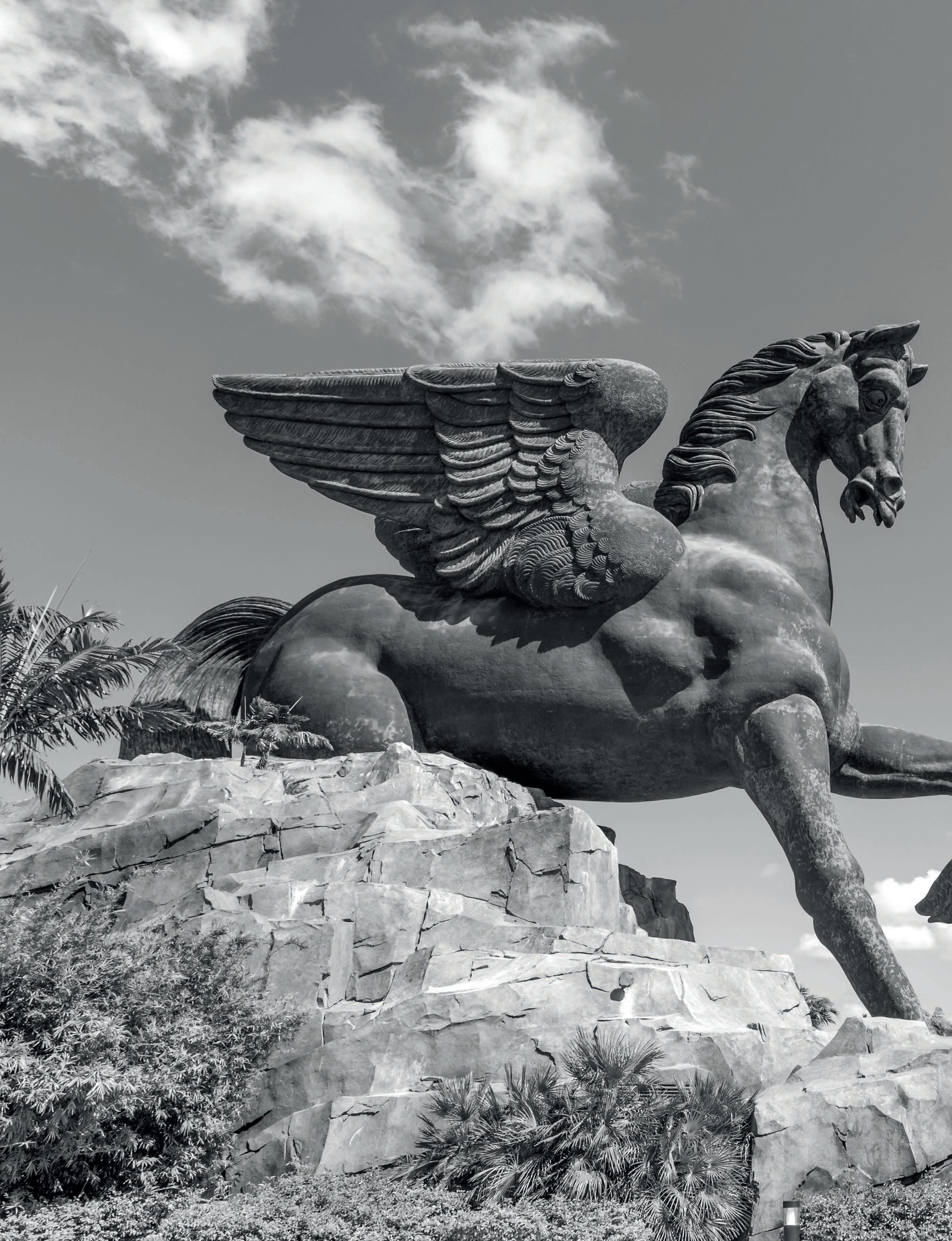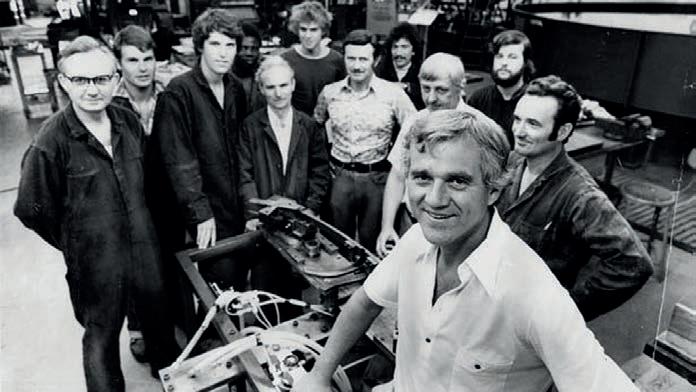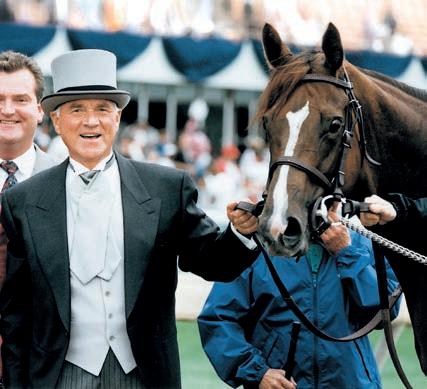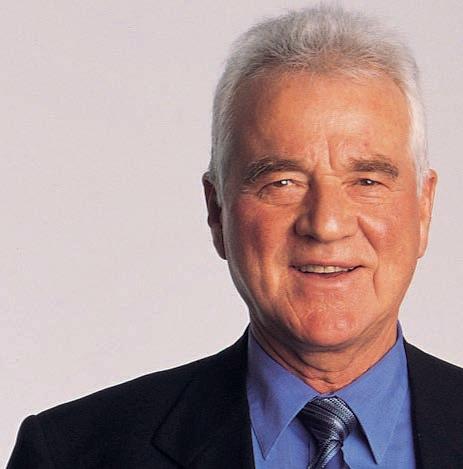
8 minute read
IF YOU DO SOMETHING PARTICULARLY WELL, YOU CAN BE ONE OF THE BEST"
THE FRANK STRONACH STORY
Styrian Frank Stronach is probably one of the most fascinating figures in Austrian economic history. From toolmaker to head of a global corporation, from hobby rider to the most successful racehorse breeder and largest racecourse owner, from visionary to philosopher - follow the unique life story of Frank Stronach, who managed to become the world’s number one in three different fields.
Advertisement
FRANK STRONACH –FOUNDER OF MAGNA INTERNATIONAL INC.
Trained as a machinist, Frank Stronach left home at the age of 22 during the economic depression and set off across the pond - a suitcase and 200 dollars in his hand. Fate decided in favour of Canada, the first country to grant him an entry permit.
The first months away from home were hard and formative. After a few years, the money saved as a dishwasher and potato peeler was enough to start a small workshop in a rented garage.

The one-man workshop became the most diversified automotive supplier in the world: MAGNA. There is virtually no car in the world that doesn’t have at least some part of Magna in it. Headquartered in Aurora, Ontario/Canada, Magna employs 165,000 people in 420 production facilities in 29 countries with a turnover of approximately 35 billion US dollars.
HORSES – THE BUSINESS OF LOVE
Frank, as everyone may call him, analyses his success modestly:
Fate or circumstance probably had a hand or hooves in the next success. Actually, Frank had always been very close to nature and wanted to live on a farm. After five years he fi nally had a bit of money in the bank, influenced by cowboy films and be cause horses had always interested him, he thought:
“I’ll take a Sunday off now and then and go riding in the countryside. Then I saw in the newspaper ‘riding horses for sale’. So I went to the farmer and bought the first horse I saw. That’s how I started riding. I’m a technician, I work with machines, it’s all about thousandths of millimetres, so riding was meant as a balance to the other life. We are developing further and further away from nature, and I see the horse as a link between man and nature. And somehow I got more and more involved in the horse thing. The farmer in question also had racehorses and once took me to the racetrack.”
A short time later he bought his first racehorse for 700 dollars - a mare called “Miss Scooter”. A well-behaved horse that could win a few small races and with the prize money, the first step towards his own racing stable was taken. “A business of love” is what Frank Stronach calls his new great passion and it was only a matter of time before the successful Magna founder found his way in the racing world and became one of the most successful racehorse owners and breeders in the world. His ap proximately 1,000 noble thorough breds are at home on three exclusive farms in Canada and the USA, de pending on their use - whether race horse, broodmare or stallion. It only takes a few hours by car to drive the kilometre-long paddock fences of the Stronach studs. An investment that paid off.
His horses, some of which he bred himself, have won more than 225 of the most important races in the world and Frank himself has received the Eclipse Award, the biggest American award for the most successful racehorse owner and breeder, dozens of times. In Canada he also won the Canada’s Sovereign Award in both categories for many years.
One of his most successful horses was the stallion “Awesome Again”, bred by himself, who won the coveted Breeders’ Cup and earned more than 4.3 million dollars for his owner. “Awesome Again” was immortalised in the Canadian Horse Racing Hall of Fame in 2001.
“When Awesome Again was born, Magna was on a high after a low and became awesome again. When I first saw the foal I knew that this horse had everything in him to become a great champion and I gave him this name.”

© Stronach Group
A son of “Awesome Again”, the stallion “Ghostzapper” was able to follow in the footsteps of his famous sire and make success history for his breeder and owner Frank Stronach. Like father like son, this exceptional horse won the Breeders’ Cup and went down in history as the fastest horse in the world. “Ghostzapper” earned his owner more than 3.4 mil lion dollars in prize money, and after his racing career he earned many times that amount with a stud fee of 200,000 dollars per successfully sired offspring.
But the business of love should go further - anyone who knows Frank Stronach knows that he always has new visions and he sees the big picture.
“I bought racehorses, suddenly had champions, spent a lot of time at racecourses and realised that they were badly managed and that things could be done better. So I combined that with my love for horses.”
The cornerstone of the new Stronach activities was laid in December 1998 with the purchase of the most beautiful racecourse in the world.
Santa Anita Park, a racetrack jewel near Los Angeles that opened in 1934 and attracts more than a million visitors a year. Subsequently, 14 more racetracks were acquired. The new listed Stronach company operates and modernises the racetracks with a new concept of entertainment and additionally becomes the market leader in horse betting.
Today, the Stronach company is one of the most important players in the American horse industry, which contributes significantly to the US economy with about 20 trillion US dollars annually and secures 1.4 million jobs.
PEGASUS, THE HORSE OF HEROES AND GODS
Another horse, a creature of Greek mythology, has captivated and inspired Frank Stronach - Pegasus, the horse of heroes and gods.
Driving along the Atlantic coast on the US highway, it suddenly appears above the palm trees - the largest horse sculpture in the world. The bronze monument at the entrance to Gulfstream Parks, also a Stronach racetrack, embodies the courage, strength and speed of the horse. Weighing more than 715 tonnes and standing about 30 metres tall, it is one of the largest bronze statues ever erected.

On the Atlantic coast, right on US Highway suddenly emerges the largest horse sculpture in the world. That Bronze monument of the horse “Pegasus” at the entrance to Gulfstream Parks, also a Stronach racetrack, embodies the courage horse power and speed. Weighing more than 715 tons and about 30 feet high, it is one of the largest bronze statues ever.
© Shutterstock
“The sculpture is intended to show and honour the contribution the horse has made in the history of mankind - from the battle chariots and their teams in Rome to the Crusades and the opening up of the Wild West by the cowboys. To do justice to the noble character and strength of the horse, something fantastic, heroic and epic should be created.”
Inspired by mythology, Frank Stronach created the Pegasus World Cup, an extraordinary innovative horse race, unique in history and the highest paying race in the world. The best twelve horses in the world compete against each other in one race - entry fee one million dollars, the winner receives seven million.
Today, this race is a fixture of the “Who is Who” and one of the big gest American sporting events with a betting turnover of more than 43.8 million dollars.
HOW FRANK STRONACH’S LOVE OF HORSES AND NATURE ALSO MADE HIM AN ECO-FARMER
Today, Frank Stronach runs a 40,000-hectare organic farm called “Adena Farms” in Florida. The freerange cattle are given no genetically modified feed, no growth hormones and no antibiotics and are slaugh tered on their own farm without pain or stress.

© Stronach Group
“When you get older, you sometimes also ask yourself what the meaning of life is. I think it’s bad that we eat so many chemicals. In the past, allergic children were unknown, allergy was a foreign word. And then I set out to produce food that was free of chemical additives. Because the saying is true that you are what you eat”.
“I am still not sure if it is really right that we keep animals to then slaughter them. The name Adena refers to an Indian tribe whose philosophy I liked. They see themselves as custodians of the land for future generations. They respect animals more than we do today, and they preserve the land and animals, living a life in balance - we have adapted this philosophy. The laws of nature strive for balance and equilibrium, and the laws of nature are always stronger than the laws of man...”
Today, Frank Stronach is still full of vision and drive. He is currently building a factory for his micro-electric car called “Sarit” and is setting up an organic restaurant with an organic supermarket chain in “Frank’s Organic Garden”.
When asked what else he plans to do, the 90-year-old Styrian answers meltingly:







